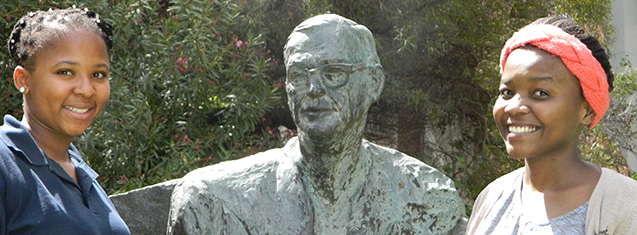Latest News Archive
Please select Category, Year, and then Month to display items
![]()
The National Research Foundation (NRF) ratings are considered the benchmark for research excellence. This year the University of the Free State (UFS) has 17 newly NRF-rated researchers. This brings the total number of NRF-rated researchers at UFS to 160.
NRF ratings are allocated based on a researcher’s recent research outputs and impact as perceived by national and international peer reviewers. The rating system encourages researchers to publish high-quality research papers in journals of high impact and to publish books through reputed academic publishers. The NRF rating system is a valuable tool for benchmarking the quality of our researchers against the best in the world.
Research at the heart of the UFS
Prof Francis Petersen, Rector and Vice-Chancellor, has indicated that the UFS provides significant support to researchers to apply for new NRF ratings or to re-apply for rating. These initiatives include the mock NRF rating panels managed by the Prestige Scholars Programme (PSP), evaluation of individual research outputs and recommendations on timely applying for rating, and improvements on rating applications by a panel consisting of internal and external members. These initiatives are bearing fruit by increasing the number of rated researchers who will transform the research profile and increase the diversity of UFS researchers.
Cultivating the best researchers.
According to Eleanor van der Westhuizen, from Research Development: “The rating of individuals is based primarily on the quality and impact of their research outputs over the past eight years, taking into consideration the evaluation made by local and international peers. It identifies researchers who count among the leaders in their fields of expertise and gives recognition to those who have a sustained production of high-quality research outputs. Several South African universities use the outcomes of the NRF evaluation and rating process to position themselves as research-intensive institutions, while others such as the UFS provide incentives for their staff members to acquire and maintain a rating.”
Cream of the crop
The UFS has also upped the ante with regard to its total number of NRF-rated researchers during the latest rating and evaluation, with an increase from 149 to 160 rated researchers in 2018.
Prof Heidi Hudson, Dean of Humanities, received an NRF B-rating, which brings the total of B-rated researchers to six. Other B-rated researchers incude Prof Johann Meyer (Mathematics), Prof Fanie Snyman and Prof Francois Tolmie (Theology), Prof Felicity Burt (Medical Microbiology) and Prof Andre Roodt (Chemistry). A total number of 10 new C-ratings and six new Y-ratings were achieved during the 2018 evaluation process.
“NRF-rating is indicative of the university’s drive to enhance its research profile nationally and internationally. Congratulations to all the scientists and scholars who received a rating in 2017. I am thankful to our academics for their commitment to the rating process,” said Prof Corli Witthuhn, Vice-Rector: Research at the UFS.
Kovsies among top SADC debaters
2014-11-26

From the left are: Matlhodi Leteane and Lehakoe Masedi.
The UFS Debate Society is definitely not all talk and no action. They ranked 10th at the Southern African Development Community (SADC) Debate Open held in Gaborone, Botswana, from 14 – 16 November 2014.
Kovsie students Lehakoe Masedi (second-year BCom Law) and Matlhodi Leteane (first-year LLB Law) teamed up to represent our university at the prestigious SADC event hosted by the University of Botswana Speaking Union. Eight Southern African countries were represented as well as six universities from South Africa.
“Attending a tournament focused on the debating of regional issues and solutions was a great reward and we wish to take part in more of these tournaments in future,” says Lehakoe.
Out of a pool of 40 of the best individual speakers in Southern Africa, Lehakoe and Matlhodi were jointly awarded 18th place.
“Debate continues to help the growth of the student community and the attendance of such debate tournaments lends a lot of help to the internal growth of not only our partnership but our debate society as a whole,” says Lehakoe. “We take great pride in our performance, especially as first-year *British Parliamentary speakers. We wish to improve and grow as we progress further in our debate careers.”
*British Parliametary speaking is the style of debating used by university institutions.